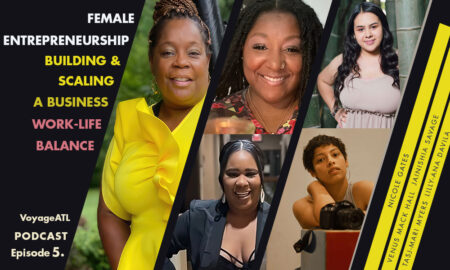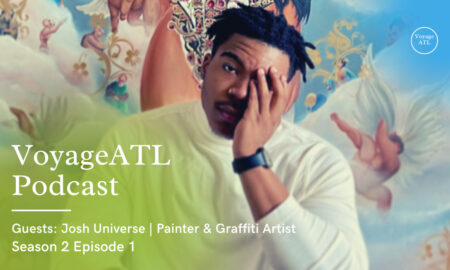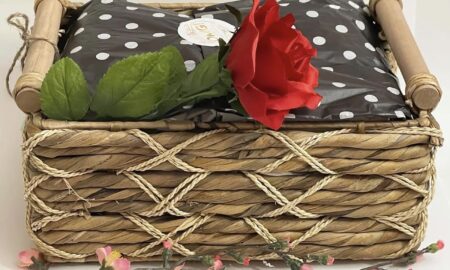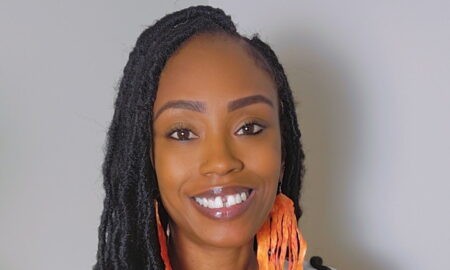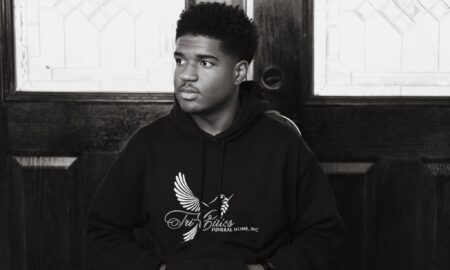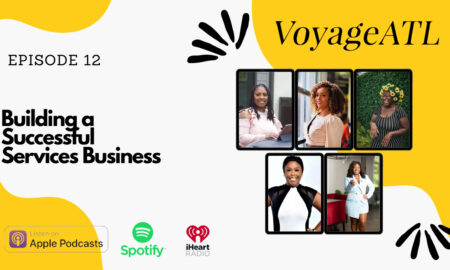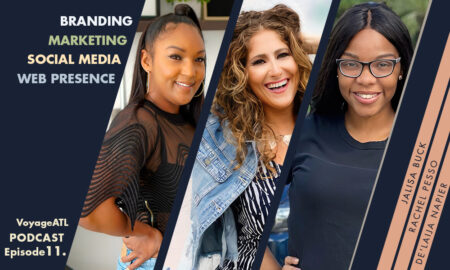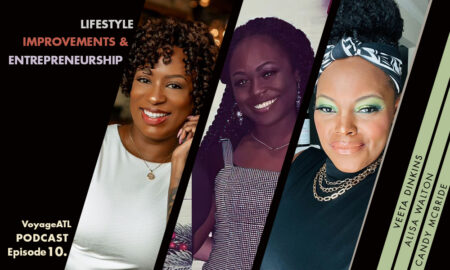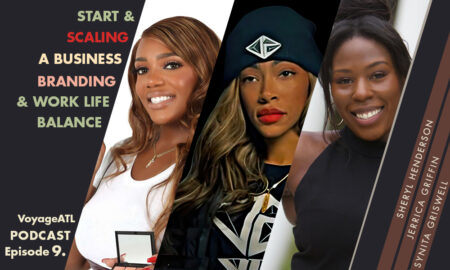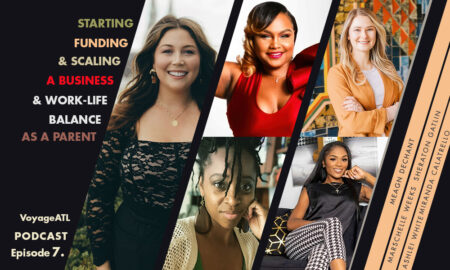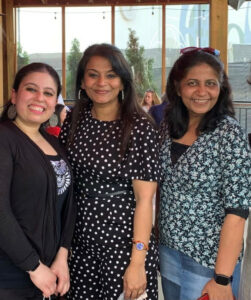 Today we had the opportunity to speak with someone who blows us away every time we connect with her. She has an unlimited collection of stories, insights and wisdom. One of our favorite moments was when she talked about deciding to take a seat at the table rather than being on the menu.
Today we had the opportunity to speak with someone who blows us away every time we connect with her. She has an unlimited collection of stories, insights and wisdom. One of our favorite moments was when she talked about deciding to take a seat at the table rather than being on the menu.
She’s also a content partner, content partners help Voyage in so many ways from sponsoring our mission, to spreading the word about the work we do and collaborating with us on content like this.
Nazeera is the Founder and CEO of Vendorship Inc where she helps small business owners, under-represented minorities and others secure government contracts. Combined with her prior experience as a public official and medical doctor, Nazeera has dedicated her life to having a meaningful impact on the betterment of the community – economically, politically and health-wise.
Connect with Nazeera Dawood & Vendorship Inc.
- Website: https://www.vendorship.net
- Linkedin: https://www.linkedin.com/company/vendorshipinc
- Twitter: https://twitter.com/_nazeeradawood
- Facebook: https://www.facebook.com/vendorship/
- Youtube: https://www.youtube.com/channel/UCgnpSOM59LgsuN9a4VG1sTg
- Other: https://www.chaiandjustchat.com
Transcript:
Alex (Host): So to, to get us started, I want to go to a story that you, you told us in the, in the pre-interview process, when you were six years old, you stood up and declared to your mother that you wanted to be a doctor and dedicate at least a part of your life to expanding opportunities for children and families, regardless of background, one incredible declaration for a six year old to make.
Alex (Host): And two, can you kind of take us to that moment and. Give us an overview of the, the journey from there to ultimately becoming a practicing physician.
Nazeera Dawood: Wow. Yes, definitely. [00:02:00] Alex that’s such a defining moment. Family, a close knit community of villages. And, usually in that part of the society many, many years ago, been more considered to be a domestic person, sort, cooking, serving the husband, making sure the house screen, and they were never. Women would never really consider to be like going out to work or professional in the professional society, right.
Nazeera Dawood: Was considered as man’s job. but, as I started thinking, differently, like I had no mentor as such during that time, because my mom had only studied in third grade and anyone I would see around me was usually a good wife. And, so [00:03:00] that’s when I, you know, in my mind, And so that was one part of how I grew up, you know, to an extent, but there was this another part within me, sort of like a fire that I wanna be something different.
Nazeera Dawood: I wanna do something great. I want to be that change agent, and think differently, like why not? Right? Why should I just followed the norms that everyone has set in this society? Why can’t I question? And, and, I remember. During those ages might be I’ve watched something or something happen where I felt very deeply for the, population who was not privileged to have much.
Nazeera Dawood: So not necessarily claiming them as indigent, but definitely someone who could, benefit more. And that’s when I felt like I wish I could help them and, and work better than, you know, not becoming than becoming a doctor. So that’s when I realized. I do want to become a doctor number [00:04:00] one, to change the norm in the society, that women can become professionals.
Nazeera Dawood: And then number two, for a purpose to change that norm was to serve the poor. Wow. Wow. I mean, and so I declared that and it, as I write in my articles, it was a distant drain for my mom. but, you could see the fire in my eyes that I meant. And during those days, I usually was the top student. So even in school, I would like always, I would cry Alex.
Nazeera Dawood: I would cry if I even. Went to a second rank. So they were, we were ranked so first rank, second rank, third rank student. So when I become second rank in my third grade or second grade, I’ll go and fight with the teacher on why did you cut my 0.5 marks? So I was always like, wanted to be the top, top in class.
Nazeera Dawood: So I came from that, a bit, I made the change things that were around me.
Alex (Host): And then you, and then you, you know, [00:05:00] found that success you ultimately did, did become a practicing physician.
Nazeera Dawood: Yes. Yes. So that, that does have a different, too many stories of, of how I crossed the obstacle. So I remember once I finished, even beyond my 10th grade that I wanna go to high school was sort of a fight.
Nazeera Dawood: I, you know, my. Grandparents, like we’ve not never had any girls from our society go through, you know, high school and all that. So anyway, I went through that and then came time to get into medical school. And my, I remember my brother still saying why you wanna waste so many years in med school and then ultimately you’re gonna be cutting onions for your husband at home.
Nazeera Dawood: So all that money, all that time. Spent and, you know, I just heard in one year then I didn’t let it, you know, sink in. I just left it out the other. but, I was very adamant, and I remember I didn’t eat for one whole week. I must have. I’m sure I drank quits, but, at that time they knew there was no other way to turn back.[00:06:00]
Nazeera Dawood: She only seeing the way forward. And so then they all agreed. I should go to, medical school. And so I, I got into it because if I had gone without food the seventh day, I would’ve probably be not a lie then. Wow. so when I speak to the young students, I do tell them, Alex, that, you know, it’s good to be adamant, but for.
Nazeera Dawood: Could cause for something that’s bigger than your vision, bigger purpose, you can be adamant about like, I need a smoke or I need to go drink. You know, that’s not a, that’s not like something big or huge you’re doing for the society, but for something huge. And especially for education, education, education, you can be adamant in securing that further education.
Alex (Host): So, I mean, now, you know, you, you speak to students and, and some students who, who may be experiencing, similar pushback or pushback on, on some dreams. They’re, you know, they, they have you to look to, but was the, was there anyone that you were looking to and be like, no, I can do it. I can, [00:07:00] I can go beyond.
Nazeera Dawood: Wow. I never thought about it, but Alex looking back. No, I thought the fight alone, I thought, the fight alone, but always quote reminds me, you know, I’m not able to exactly make the quotation, but it sort of says, you know, it it’s okay to start a new path. You don’t have to always. Go on the path that was already set for you in, in the past, or, you know, in your, in your community or society, you can always trail a new path and let others lead.
Nazeera Dawood: So one thing I’ll never ISS daughter after years, you know, when she called and she thank you. You let the path, you paint the path for. We were able to go get our professional education as well. Yeah. So I, I don’t remember having any mentor, but I think that this is for each one of us and you and everyone listening, if you believe in something.
Nazeera Dawood: And if you, know you wanna [00:08:00] it’s, it’s not just for your inner soul and inner heart, but it’s gonna do good for the broader, You, you go for it. You know, they say where there’s a bill, there’s a way. And I think it’s the bill that you have to set up, whether you’re five years or seven years, 40 years 50, or it’s the same, you just have to, there’s nothing, there’s no one stopping you.
Nazeera Dawood: And we know our power and I tell the young kids this all the time, you, you don’t even know, you know, you power. If you just knew what the power you had in this, in this world, the whole world would be like probably doing much better, or you’d been a, you know, in a very good
Alex (Host): state. So you then become, you become a, a practicing physician.
Alex (Host): but you know, that’s that, there’s, there’s many more questions to come in this interview. That’s not the end of the story. what, what was your experience as a practicing physician and, how did that. Play into where you went next in the future.
Nazeera Dawood: A great question. as I look back, when [00:09:00] I, I didn’t practice in the us, I definitely practiced in India.
Nazeera Dawood: It was a charitable hospital. So as my, as a six year old, what I had dreamed of. I was able to accomplish. I would be up day and night. I would become very, I would create these great relationships with patients and, in the hospital that I charitable hospital were not about profits. We were about serving, people who couldn’t, huge, some in their surgeries or, you know, getting treated would come.
Nazeera Dawood: A particular hospital. It’s a very well renowned hospital in the state that I lived in. it’s it’s called Gandhi hospital. It followed the, themes, and, and the principles of Gandhi, which is truth, always prevails and, giving back right. So Gandian principles. And, I remember like working day and evening, and I was the junior doctor in that hospital, but, in the, in, in India, the system is different.
Nazeera Dawood: you don’t like there’s [00:10:00] no appointment. So you would, patients would just come pouring in during the op you know, outpatient time. and I would have this huge queue waiting to be seen by me. And there were all these senior doctors in other rooms, who. Very few patients to be seen and they always wondered, like, why do they all want to see you?
Nazeera Dawood: Nare like, we don’t understand why ZQ such a long queue of patients you have. And then I realized it was, I think the secret was just to be heard. I think when, when they were just heard, I felt 50% of their issues or problems that they had in their mind or body, just, just dirt. And of course the remaining was other physical reasons they would be needed to be treated on.
Nazeera Dawood: But I think that was what was missing. Across, not just in the medical industry of kindness, of, listening, someone listening without judgment. And, I I’ve realized many times when I would be listening to the [00:11:00] patient. I would, sometimes I have theory eyes. I would just out because I would for them too much.
Nazeera Dawood: And, so I, that was the best part of my. Treating the patients, because they would really consider you as, you know, their gods that you could, you know, treat them, you could give them a better life, better quality of life. and so my experience as a physician has really, been a, you know, a mark in my life, a positive mark in my life, but that’s where the new question to ask that’s.
Nazeera Dawood: If they answer your question, where did that lead to was? I realized there were so many. Broken links in the medical system that we were treating patients after they had complications after they get, they were getting blind after their sugar level, they shoot really high, you know, and, they would go unconscious or their hypertension and they were stroke.
Nazeera Dawood: So most of them were. A [00:12:00] preview of being educated to prevention and, you know, and, their quality of life has decreased by then because they don’t even know their blood sugar levels that hypertension, their mental stress, how much they’re stressed. so that’s when I realized I want be on the other side, instead of treating patients one by one, I wanna actually, treat the community, by educating on prevention.
Nazeera Dawood: So my thought process completely changed from treating one person to community treatment by education and prevention methodologies.
Alex (Host): Wow. And so, so I mean, I think a lot of us, became a little bit more aware of. Governmental public health policy, you know, in the last few years that maybe we, we with an awareness that we didn’t have before, but you were, you were working in public health well, before the pandemic.
Alex (Host): So what was that, what was that experience like? And how did you [00:13:00] kind of find yourself into the, the positions you.
Nazeera Dawood: Great. Great question, Alice. I always love to talk about that. So, I, once I realized that I wanted to treat the community, I wanted to take it very strategically. So I completed the masters of public health at UNC chapel hill.
Nazeera Dawood: So I’m able to understand the groundwork, the, the, you know, thenot of what is actually needed. And, of course, after going into Emory university for a few years, I joined the local health department and Alex to this day say, it was my change job and people usually. Raised it eyebrows. He worked in the government and they called that a dream job.
Nazeera Dawood: It was, it was my dream job. It was my dream job. Cause I was able to open the doors of the government on the resources that it had for the community without the fear of the community approaching the government. Right. So I opened up those doors, we built coalitions and you would see the commissioners and elected officials sitting in the same [00:14:00] level as a homeless veteran.
Nazeera Dawood: On the same table and discussing what is it that they can. Right. And, all these, a people who want advocate for prevention, homelessness, or, heart healthy, healthy living, smoke prevention, you know, smoking toxicities or secondhand prevention. So all those, asthma prevention. So all those at community S everyday community people who really wanna create that change came together.
Nazeera Dawood: As you know, I was facilitating these coalitions and they didn’t see me as a threat cause though I was in the government. I was coming in as a person who open doors and who sort of change the culture of what has already been viewed of the government as, and we built coalitions, we received and. In fact CDC, a 9 million grant, during the time when I was building the coalitions, because they [00:15:00] wondered your county doesn’t even have the resources.
Nazeera Dawood: And how are you? how are you basically, you know, doing all this, like, how was this happening? and you know, all I said was you just open doors and you shake hands and you smile and people will. Without fear. And we created several changes. We created several policies and Alex, during that time, my middle name was PSE.
Nazeera Dawood: The people always said, if you know me, if you’re shaking my hand and if you’re walking out the door, you should know our policy. Right. So it’s just policies. Systems and environmental changes. So if you want to make a huge change in the community, it’s very hard to go one by one. The only way you can make changes is through policies and through systems, the school systems or anything you do better.
Nazeera Dawood: And then of course, environmental changes, which is always, you can keep. You can’t keep complaining about an environment that doesn’t bear fruits and the trees all littered out with no, [00:16:00] unless you water it. So you can’t bring the tree for growing up and not bearing fruits. Sort pour in more nurturing fertilizers and water and then over.
Nazeera Dawood: So we always used to about upstream methodology of do we
Nazeera Dawood: of hope. I, I hope I’m not confusing and sort of answer your questions.
Alex (Host): No, no. I mean, that’s, it, it’s such a, a refreshing kind of view. What it can, what it can be to, you know, I think, I think so many of us often think about like, the, the bureaucrats working in government, as sometimes, you know, is this person, what is this person thinking?
Alex (Host): What do they wanna be doing? What do they wanna be accomplishing? And to kind of hear it from that perspective of like you, this is the spot where real change can happen. Yes is, is [00:17:00] such a refreshing view for it. And, and you, you ultimately, you then take. Try and take it a step further, right? You, you run for office.
Nazeera Dawood: Yes, I did. I, I did, I did run for office in my local city because I learned, during the time with the county health department, I learned that, you, you, you are either on. You become the menu or a, that you should be, you know, you should be able to create the menu. So I wanted to sort of change that and say, Hey, you know, I want to be, able to create that menu and, and make it work for the broader community.
Nazeera Dawood: And, so, and, and there wasn’t never ever any politics. In my background or in my family, I’ve never done politics. All I know was that I wanted to serve and make a difference and, be at the table, and not become the menu. That’s what I tried to mention earlier. So try to be at the table and not become the menu.
Nazeera Dawood: And, and. That [00:18:00] be, be there in making, changes in creating policies that will benefit the broader and creating equity. I wouldn’t say quality, but equity and, so that’s when I said, okay, I wanna run, you know, just with no background in politics at all, but I would say. The campaign and all that I went through, in a, in a city, you know, such a diversity, but still I was the minority.
Nazeera Dawood: And, it, it changed my life. It changed my perspective. I became much stronger. My goals and purpose in life became much, much, more clearer. And with clarity, I always, and I came up with such experience, so many fellowships and friendships I created, but I also understood during the campaign. That the fear of the unknowns that people didn’t know me.
Nazeera Dawood: I became the Eagle or the devil I’m in public health. And she’s gonna tell us what to eat, when to smoke, what, to smoke, where to go, what to do. [00:19:00] She’s gonna, you know, bring all the she’s up, gonna open up the doors for the Syrian Syrians and all the refugees. And, and I’m like, The, that position is not made in the local level much at all.
Nazeera Dawood: And so, anyway, I wanted to, I said, oh my gosh, they have so much fear of me. I’m I can imagine I’m the kindest person, right. To myself and others. And I said, maybe, maybe so once I didn’t make it to the city council, I realized I wanted to, open up these discussions. We can bring different opinions, respectfully disagreeing, but making sure that fear is taken away, that now, you know me, you don’t have to fear me.
Nazeera Dawood: I’m just like a human being. Like you, you know, I might look different. My color might be different. I might have an accent, but deep down, you know, I used to have the same. I have a heart and lungs and organs that you have. so [00:20:00] that was my message. And I just started. A monthly discussion called try and just chat, you know, having Chi and let’s chat and people enjoyed coming.
Nazeera Dawood: I mean, diverse panelists, I would prepare for the moderator discussion, host it and. Fellowships developed during this time of understanding different perspectives, different topics, not just politics, but cultural, you know, always people had these questions and cultures. I would bring those cultures together and say, okay, let’s talk about it.
Nazeera Dawood: Like, why do I fear you? Why do you not know me still? And I’m here your neighbor. And so those are the discussions that continue for many, many, and can still continue. This is the fifth year of such discussions and that all. Wrote it out because of the, campaign that I, that I ran for and I realized what was missing.
Nazeera Dawood: So it goes back to the first question that the second question you asked, I was always realizing where the missing link was. And [00:21:00] I would sort of was my career and my next steps in life towards how, how can I add something towards that?
Alex (Host): You know, one of my questions here. And in, in, just in awe, the, the ch just ch the success of the ch just chat.
Alex (Host): but it also strikes me that it has been unfolding against a backdrop, especially in the United States where, you know, things are becoming where things are becoming even more polarized. and people aren’t, aren’t having those discussions. So I, I’m just curious your thought on how do we have. More of those discussions that you, you facilitate at ch and just chat, in an era where.
Alex (Host): It almost feels like critical thinking for so many people has gone out the window and they just wanna be on the winning team.
Nazeera Dawood: yes. Very a great question, Alex. Thank you so much. So I would say, there has to be some initiation of such discussions [00:22:00] across the country. it has to be coming from, you know, Ultimately, I think people, people are good humans.
Nazeera Dawood: we just get, oh, I need to tell you this. So you understand more where I’m coming from. So when I joined the government, I had this huge, this huge support from an internal team member. She said, we can get so many things done out you because you’re not tainted. And if you really go back to that sentence and I think about it still, she was so right.
Nazeera Dawood: Cause it came from an environment where. The government, all I wanted was to do good, make changes, health policies, and I wasn’t tainted. So as a human being, if we see we grow up with our parents telling us things, our friends, the institution we go into, some of our thoughts, but if we sort of talk it out over, we are all looking for.
Nazeera Dawood: Respect. We’re [00:23:00] looking for equal opportunities. We’re looking for integrity. We’re looking to serve our family and keep our family safe. I think this is the basic instinct of every human being, right. And when that is not served and then people start claiming they are, belief or their principles are superior than the others is when problems created, because then we are creating that.
Nazeera Dawood: That room for arguments that I’m better than you, but if we brought them to the same room, and just have, allow them to have such conversations and open with each other, they will realize. They’re not, they’ve been fighting for something that doesn’t exist. They’re they were just, they became a part of this group or depart or discussions, without understanding the other aspects.
Nazeera Dawood: So, one quick testimonial example I wanna give was when I was in the county, I was, I always brought in these coalitions. Co-chairs very diverse. So one specific [00:24:00] coalition was the asthma coalition, which would, which would address prevention of asthma. so one was old, Caucasian. I meanly Caucasian and cochair was, middle aged, a black executive lady, a pharmacist.
Nazeera Dawood: These two became co-chair. So I remember in the beginning and I know there’s, I, I love both of them. Right. I love their intelligence. I love where they come from. I like their beliefs that they want to make a change and prevent asthmatic deaths, complications. And bringing these two together, they would always come in initial stages.
Nazeera Dawood: They would always come to me as a government employee. They would always official, always come to me and complain about each other. Oh, she thinks she has entitlement or he’ll say, oh, he thinks he has all the privileges and we can talk like this. And what I did, I would, I just said, you [00:25:00] guys can do. Sit in the room together, have lunch and then sort it out.
Nazeera Dawood: I said, I’m, I’m not letting you go ask co-chairs. You are the co-chairs and Alex, believe it or not. Within six months, they became the best of buddies. And they would actually by fight me. So I would say, Hey, I’m a brown light and you’re fighting me. It was that how I saw. And those breaches are not being built.
Nazeera Dawood: Those are being broken. And how do we find more people who can builds cultures and different belief systems and anything, everything that we talk about, you know? I, I, yes, it is missing. And I think, People like you and who has the power to, you know, podcast, her voices can be heard in videos and thousands, all.
Nazeera Dawood: Is that in mind? Or intention, they call it an intention, [00:26:00] that I wanna, I see these fighting or I see that these can get together, just invite them over. And it, at their home don’t have a big, you know, then increase the group and say, what are the, that are happening? How do we address it? And these are like, benign, you know, conversations that can lead to huge, fellowships in the
Alex (Host): future.
Alex (Host): When I hear you, when I hear you speak about a lot of this, a lot of this work and especially these things right now, and so much of it happening, at the both individual level, and then your work doing it at the, the local policy level, how do you, how do you not look at the, the mountain of work ahead of you and just become overwhelmed or exhausted by it?
Alex (Host): How do you continue to. To stay driven to, to serve the community in this way.
Nazeera Dawood: So, one thing is because I know what my is.[00:27:00]
Nazeera Dawood: I’s.
Nazeera Dawood: Right now, but do you have an answer? Do you know your purpose? So I went through, several, especially during the campaign, after the campaign, before my purpose, do I continue to be bombarded and, you know, hit upon on what my belief is, which is I’d like to bring people together. That’s my purpose.
Nazeera Dawood: So I, I feel if that is my purpose, I. No matter what happens, what obstacles come, I’ll go to that that’s being mean, right? Because I found the purpose of people. I think sometimes don’t know what the purpose is. Sometimes it’s sad that they leave the world, without know what their purpose was. We all can children, we can take up.
Nazeera Dawood: Those are every human’s responsibility to take care of their children. Their children get married. That’s not. Being a human, but there’s something beyond that’s called a purpose. And that sometimes comes through your [00:28:00] spiritual, journey or spiritual voyage. You feel me. And, so that is something that people have to understand, and find out.
Nazeera Dawood: And then you, I have my communis like I have a puppy two years ago. I was so scared of dogs and I would never go near a dog. And now that puppy is like the love of my life, you know, he’s true now. And I’m, I just on walks morning after evening, I think about it. Like I missed my whole first part of my life.
Nazeera Dawood: Being near a dog and I could have gotten so much love and given so much love, innocent love. So this is fair because I came over that fear and how much I’m getting, being with that puppy. And that puppy being with me, you know, serving other love and kindness. So that’s, so that’s something, I took a step that why am I fearful?
Nazeera Dawood: What am I fearful about? Let me let. Take that risk and understand. And so I think, [00:29:00] you get, so what I do is of course I go through interrogating myself internally. I seek answers with. And I don’t, I have learned much after my campaign to have a field in front of me. So anything that’s thrown at me is not going deep inside and changing me.
Nazeera Dawood: They say, don’t let people change the world, but let your change the world. Right. So don’t let the people change your, but let your smile change the world. So that’s the thing I believe in, just because I believe in the goodness of everyone, it’s just that sometimes they have to be. Themselves up on what they can be for this world and this world and themselves yoga.
Alex (Host): I wanna use our, our last couple of minutes here to, to ask you about, about your current role, the, the CEO and co-founder of vendorship [00:30:00] incorporated. can you, can you tell us about the company? What, what, what kind of work are you doing now?
Nazeera Dawood: Sure. So having been in the government for a few years, I realized that there were several opportunities that were missed out by everyday business firms, small businesses, small, medilarge businesses, just cause they didn’t know how to navigate the, the government system.
Nazeera Dawood: Right. The public system, into securing contract. On offering their services to the government. so that’s in, when I designed from the government position, as the chief of staff, I, you know, I realized that this is something that people could be educated on and, we could bring diverse, suppliers.
Nazeera Dawood: we could bring innovative solution providers to the, to the field of responding to. This government contract. So what mentorship does is we are a very, we are a women own star business, committed group of team, team of women, who [00:31:00] coach any firms in any sectors and provide end to end solutions on half secure government contracts.
Nazeera Dawood: And if you see our mission is ultimately to serve the government because we are making, we are bringing innovation to the government sector, through these contracts, and contractors and vendors. And ultimately the government is trying to serve you and me and all the community members
Alex (Host): when it’s all said and done.
Alex (Host): what do you hope your legacy?
Nazeera Dawood: I, so it, from every job that I’ve left, Alex, I’ve Al I’m always leaving a legacy. I don’t believe in, I want to become 60 and do this and do that. I believe in leaving legacy every day. Right. for example, when I was in the, in the hospital, working back in India, there is a program called Dr.
Nazeera Dawood: Zeta’s program. So I left the legacy there after I came to. The county government, excuse me. I have a proclamation on my name [00:32:00] and they pro under my name appreciation day and just, wow. These appreciations, some things must have been done differently, bringing a different culture and showing them what if.
Nazeera Dawood: We do it this way rather than what has been always done. so I believe in that always, but my legacy would always speak to that. I brought together, I was kind and anyone knocked on door or needed help. I was always there for them, for them and, helped bringing them belief that they have to believe in themselves and they can achieve their dreams.
Alex (Host): Before we, before I let you go, where can people learn more about you and the work that you’re doing?
Nazeera Dawood: Definitely. So, our website, the, the business address is Vendorship.net, You can definitely visit our website contact number. Is there, they can reach out to me. at, N A Z E E R A @vendorship.net.
Nazeera Dawood: So they can write a email to vendorship.net. And for my just chat sessions, of course, it’s www do H which means and just chat do com if willing to become a panelist or become a part of this, movement that brings people.
Alex (Host): The CEO of Vendorship Inc Chai and chat and, and just an incredible life.
Alex (Host): Thank you again for joining us on the show.
Nazeera Dawood: Thank you so much, Alex, for time.






